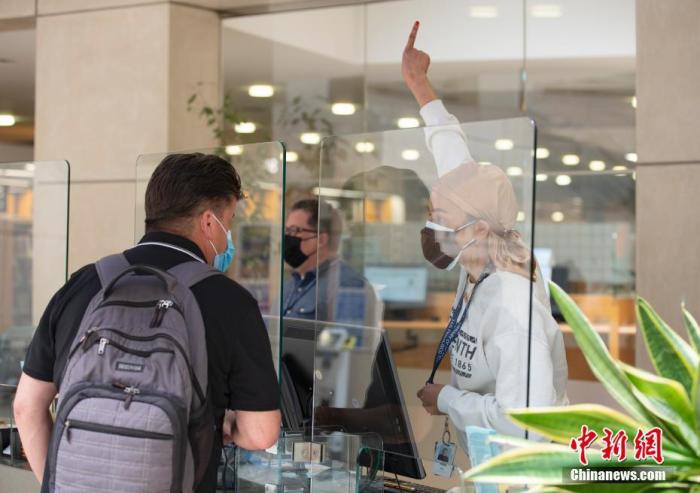China News Service, May 6th. According to the US Chinese website, the Biden administration of the United States announced on the 5th that it supports the abandonment of intellectual property protection for the new crown vaccine in order to expand global vaccination.
Some analysts say that this is an important measure for the United States to participate in international vaccine cooperation.
However, some people say that vaccine patents are not the main obstacle to more vaccines in low- and middle-income countries; some people also claim that such agreements may undermine the motivation of companies to innovate.
Data map: On April 28, local time, a long line of customers lined up in front of a discount store in Manhattan, New York City, USA.
According to reports, the current domestic passenger flow of commercial retail in New York City is close to the pre-epidemic level.
Photo by China News Agency reporter Liao Pan
According to reports, U.S. Trade Representative Katherine Tai wrote in a statement: “This is a global health crisis. The special situation of the new crown epidemic requires extraordinary measures. The government believes in the role of intellectual property protection, but must To end this epidemic, we support the abandonment of these protections for the new crown vaccine."
The statement also said: "On the basis of ensuring adequate supplies of the new crown vaccine in the United States, the government will continue to increase its efforts to cooperate with the private sector and all possible partners to expand vaccine production and distribution, and at the same time increase the supply of raw materials required to produce these vaccines. "
This week, the World Trade Organization urged member states to quickly finalize the details of an agreement to temporarily relax intellectual property protections for the new crown vaccine in order to eliminate barriers to vaccine production in developing countries.
The request was put forward by the representatives of India and South Africa, and in accordance with the WTO consensus principle, the unanimous consent of 164 member states must be obtained.
On the 5th local time, US President Biden confirmed that the White House will support the WTO's proposal to exempt vaccine-related intellectual property rights.
He said before Dai Qi’s statement: “Yes, I will talk about this later today.”
Data map: On May 3, local time, readers communicated with staff at the San Francisco Public Library Main Library, California, USA.
On the same day, the library reopened some areas under the premise of restricting the number of readers and the length of reading time.
Photo by China News Agency reporter Liu Guanguan
The analysis pointed out that the US statement on the 5th marked an important step taken by the Biden administration in global vaccine cooperation.
As the US vaccine distribution work continued to advance, the Biden administration began to turn its attention to supporting overseas.
Prior to the G7 Leaders Online Summit in February, Biden announced that the United States would donate US$4 billion in batches to the WHO-led "Vaccine Equitable Distribution Program" (COVAX) in the next two years.
Last week, under pressure from public opinion, the White House promised to send 60 million doses of AstraZeneca vaccine overseas.
On May 4, the White House expressed support for the plan to send at least 10% of Pfizer vaccines produced in the United States overseas by July 4.
At the time when the Biden administration announced the new measures, the new crown infection rate and death toll in dozens of low- and middle-income countries soared, and the supply of vaccines was far from meeting the demand.
Among them, India is the current global epicenter of the epidemic.
In the past week, the country has an average of about 380,000 new confirmed cases of new crown every day, and the number of deaths in a single day exceeds 3,500.
Nevertheless, experts still believe that the actual number of infections and deaths may be higher.
For months, infectious disease experts have been warning that allowing the virus to spread and mutate without restriction in any country would pose a threat to the world, because the emerging variants may be resistant to existing vaccines.
This threat, coupled with the fundamental concern for human life, has prompted more and more people to support the abandonment of intellectual property protection for the new crown vaccine and treatment methods.
However, it was also pointed out that vaccine patents and other protective measures are not the main obstacles to the production of more vaccines in low- and middle-income countries.
Some people also said that such agreements may harm the company’s motivation to innovate.

